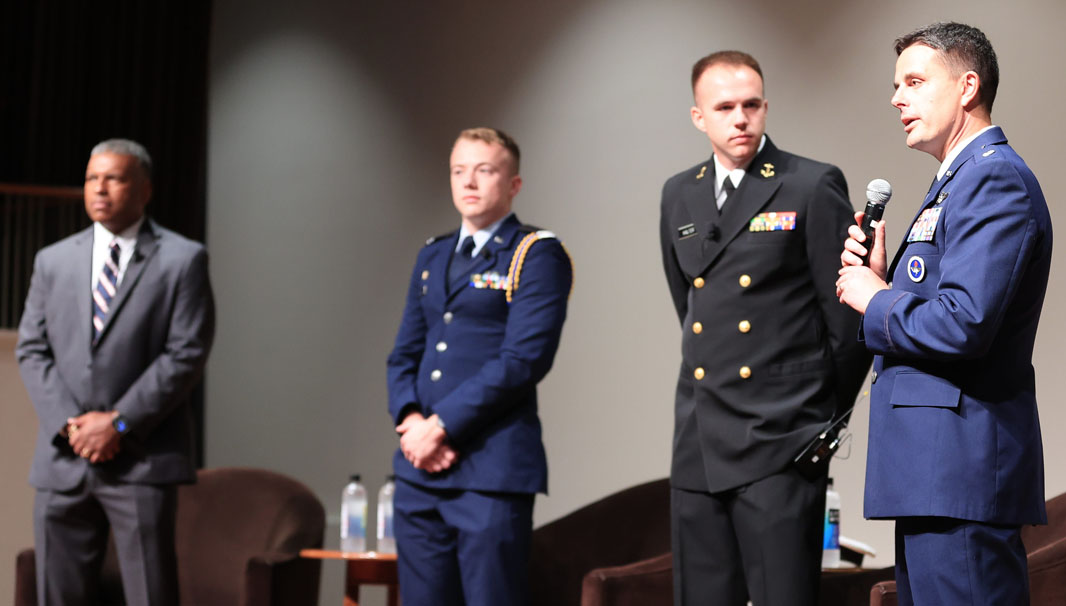Ready to shape the future: Students learn leadership lessons from global experts
Inaugural International Leadership Conference empowers students to build the skills and relationships to tackle global challenges

Ready to shape the future: Students learn leadership lessons from global experts
Those studying everything from Strategic Communication and Nursing, to Zoology, Kinesiology, and more, were all present to absorb the wisdom that would unfold as they learned alongside some of today’s most influential leaders.
“I'm hoping to strengthen my idea of leadership, learn more from people who have very impressive backgrounds, and just collaborate and understand the landscape better,” said Ava Hunt, Economics and Political Science double major. “My biggest takeaway in terms of how to be a great leader in any environment was to be humble, be approachable, and be credible.”
These three lessons in leadership were among those the first attendees gained from Lt. Gen. Richard M. Clark, executive director of the College Football Playoff and former superintendent of United States Air Force Academy, who spoke during the opening keynote session at Miami’s inaugural International Leadership Conference.
Hosted by Miami’s Air Force ROTC program, the International Leadership Conference also featured an impressive roster of additional guests including Stephanie Byrd ’81, American Red Cross Regional CEO, and Hajime “Jimmy” Kishimori, Consul General of Japan in Detroit, as well as government representatives from Hungary and Serbia.
The conference — which was designed to help students solve complex and contemporary problems alongside influential leaders to create a better future — was originally conceptualized by Lt. Col. Bob Umholtz, Chair of Aerospace Studies and Commander of AFROTC DET 640 at Miami University.
"The world has changed many times over, and we never know when it can change,” Umholtz said on the In Such a Place podcast, where he discussed the genesis and importance of this event. “So it's important that we interact internationally with others and build bonds at the individual level, because you never know how one little interaction will influence future decisions,”
“In the same way,” he continued, “we need our students to have that chance to talk to foreign partners, to get the opportunity to interact with these great leaders. And these leaders will also have the ability to see Miami as a place of leadership, and to look for leaders here to help support future plans and dynamic international programs.”
Other sessions included a panel led by Phillip Arceneaux, Miami assistant professor of Strategic Communication and director of the Diplomacy Lab, who facilitated an interactive conversation on how students and community leaders can collaborate to tackle global challenges and build more resilient local communities.
“Every problem is a global problem,” said Arceneaux. “You have to think about how the local impacts the global—and how the global impacts the local. The whole idea of this conference is to think about what are those skill sets that you need? But not only the skills, but also the mode of thinking. All of our sessions have a workshop component where it’s not just leaders up here talking to students—they actually work together to solve these issues.”
Arceneaux’s panel participants – which included Michelle Glandorf, President and CEO of the World Affairs Council, Cincinnati and Northern Kentucky – stressed relationship building, which was also a reoccurring theme that echoed throughout the entire conference.
“The biggest overarching theme that has been stressed, that I will absolutely be taking to heart, is this experience has really cemented the fact that you cannot go very far without relationships,” said Amaryah Chandler, a Middle Childhood Education major. “And they have to be meaningful, and not just trying to make friends with people in high positions. No, the goal is to make meaningful relationships that are impactful to you, to the other person, and your community.”
Other key takeaways included advice to:
• Understand that embracing humility is not thinking less about yourself. Instead, it’s thinking about yourself less.
• Commit to whatever you’re doing now as if you’ll be doing it for the rest of your life.
• Worry less about finding work-life balance, and more about finding harmony within the inevitable ups and downs of life and work.
• Realize that being a perfect leader is impossible. But that it is possible to get good at always becoming better.
One of Byrd’s final messages to attendees, especially students, during her keynote was to embrace every opportunity with courage and purpose, knowing the choices they make now will shape the future impact they will have on the world.
“You are at the precipice of starting something big,” she said.
Established in 1809, Miami University is located in Oxford, Ohio, with regional campuses in Hamilton and Middletown, a learning center in West Chester, and a European study center in Luxembourg. Interested in learning more about the inaugural International Leadership Conference or the Diplomacy Lab? Visit their website for more information.